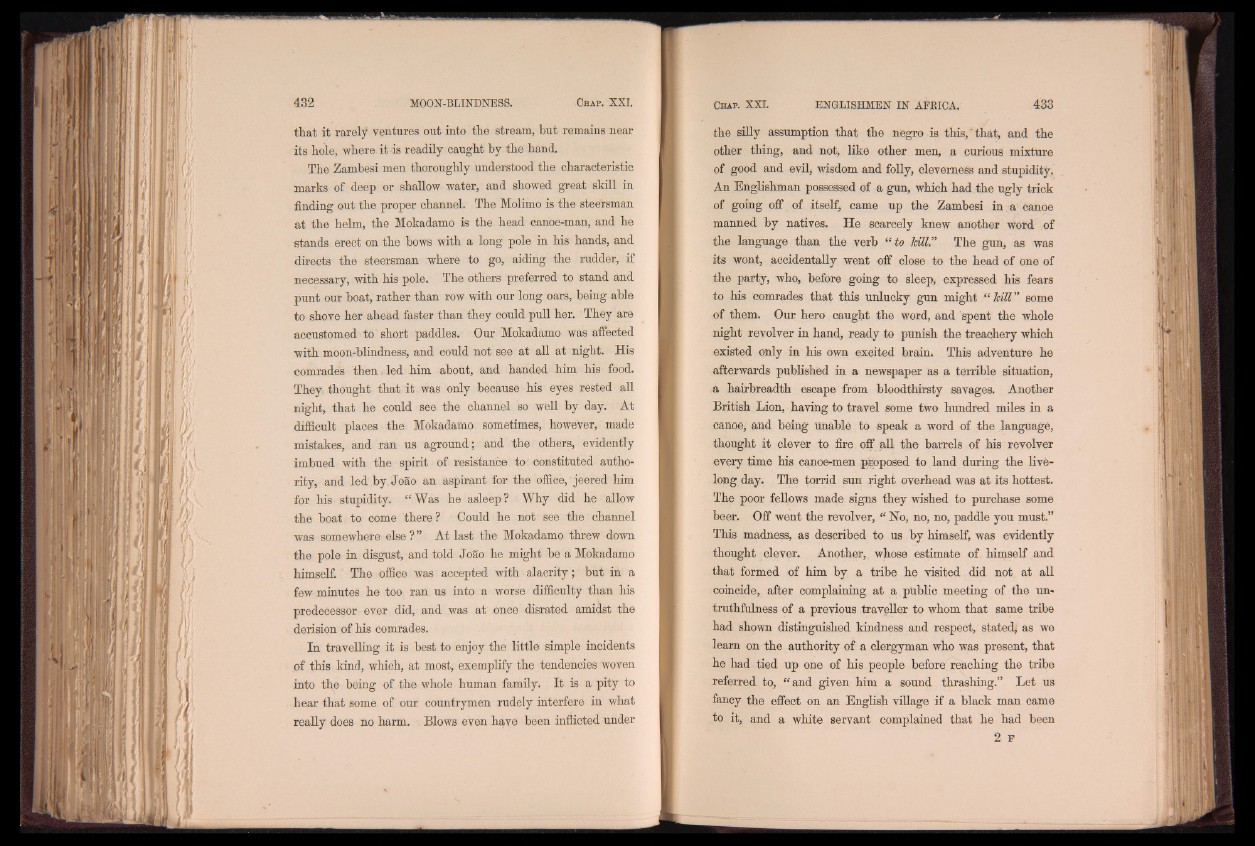
that it rarely ventures out into the stream, hut remains near
its hole, where it is readily caught by the hand.
The Zambesi men thoroughly understood the characteristic
marks of deep or shallow water, and showed great skill in
finding out the proper channel. The Molimo is the steersman
at the helm, the Mokadamo is the head canoe-man, and he
stands erect on the hows with a long pole in his hands, and
directs the steersman where to go, aiding the rudder, if
necessary, with his pole. The others preferred to stand and
punt our boat, rather than row with our long oars, being able
to shove her ahead faster than they could pull her. They are
accustomed to short paddles. Our Mokadamo was affected
with moon-blindness, and could not see at all at night. His
comrades th en , led him about, and handed him his food.
They; thought that it was only because his eyes rested all
night, that he could see the channel so well by day. At
difficult places the Mokadamo sometimes, however, made
mistakes, and ran us aground; and the others, evidently
imbued with the spirit of resistance to constituted authority,
and led by Joao an aspirant for the office,: jeered him
for his stupidity. “ Was he asleep? Why did he allow
the boat to come there ? Could he not see the channel
was somewhere else ? ” At last the Mokadamo threw down
the pole in disgust, and told Joao he might be a Mokadamo
himself. The office was accepted with • alacrity; but in a
few mimites he too ran us into a worse difficulty than his
predecessor ever did, and was at once disrated amidst the
derision of his comrades.
In travelling it is best to enjoy the little simple incidents
of this kind, which, at most, exemplify the tendencies woven
into the being of the whole human family. It is a pity to
hear that some of our countrymen rudely interfere in what
really does no harm. Blows even have been inflicted under
the silly assumption that the negro is this,'that, and the
other thing, and not, like other men, a curious mixture
of good and evil, wisdom and folly, cleverness and stupidity.
An Englishman possessed of a gun, which had the ugly trick
of going off of itself, came up the Zambesi in a canoe
manned by natives. He scarcely knew another word of
the language than the verb “ to Ml.” The gun, as was
its wont, accidentally went off close to the head of one of
the party, who, before going to sleep, expressed his fears
to his comrades that this unlucky gun might “ hill" some
of them. Our hero caught the word, and spent the whole
night revolver in hand, ready to punish the treachery which
existed only in his own excited brain. This adventure he
afterwards published in a newspaper as a terrible situation,
a hairbreadth escape from bloodthirsty savages. Another
British Lion, having to travel some two hundred miles in a
canoe, and being unable to speak a word of the language,
thought it clever to fire off all the barrels of his revolver
every time his canoe-men proposed to land during the livelong
day. The torrid sun right overhead was at its hottest.
The poor fellows made signs they wished to purchase some
beer. Off went the revolver, “ No, no, no, paddle you must.”
This madness, as described to us by himself, was evidently
thought clever. Another, whose estimate of himself and
that formed of him by a tribe he visited did not at all
coincide, after complaining at a public meeting of the un-
truthfulness of a previous traveller to whom that same tribe
had shown distinguished kindness and respect, stated* as we
learn on the authority of a clergyman who was present, that
he had tied up one of his people before reaching the tribe
referred to, “ and given him a sound thrashing.” Let us
fancy the effect on an English village if a black man came
to it, and a white servant complained that he had been
2 F